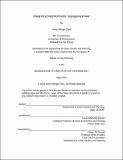Integrating neighborhoods, segregating power
Author(s)
Chen, Jenny Wenjie.
Download1193555802-MIT.pdf (1.471Mb)
Other Contributors
Massachusetts Institute of Technology. Department of Urban Studies and Planning.
Advisor
Devin Michelle Bunten.
Terms of use
Metadata
Show full item recordAbstract
Since the 1990's, tenant-based vouchers have exceeded the number of conventional public housing units in the United States. Policies to expand housing choice with mobile vouchers have grown in popularity despite program evaluations that have demonstrated modest financial and educational gains for young children and adverse experiences of social isolation and racial hostility for Black families. While existing research has focused on material and social outcomes for households who move from high-poverty to low-poverty "opportunity" neighborhoods, I investigate the effects on the political power of Black families who utilize vouchers to move from predominantly-Black neighborhoods in Boston to predominantly-white suburban towns. I draw on critical race theory and theories of collective efficacy to argue that current housing integration policies reproduce racial power dynamics despite operating on seemingly race-neutral terms. In conversations with local public housing stakeholders, I find that racial hostility and a lack of resources can cause tenants to socially isolate and withdraw from political processes in their new communities. These dynamics diminish the ability of Black households with vouchers to organize for collective priorities. Addressing this will require race-conscious approaches to political representation, resource provision, and community development.
Description
Thesis: M.C.P., Massachusetts Institute of Technology, Department of Urban Studies and Planning, May, 2020 Cataloged from the official PDF of thesis. Includes bibliographical references (pages 37-41).
Date issued
2020Department
Massachusetts Institute of Technology. Department of Urban Studies and PlanningPublisher
Massachusetts Institute of Technology
Keywords
Urban Studies and Planning.